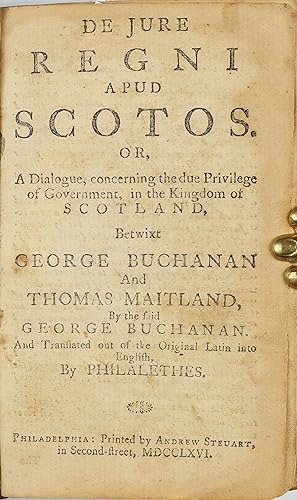Descripción
De Jure Regni apud Scotos, or a Dialogue, concerning the due Privilege of government, in the Kingdom of Scotland, betwixt George Buchanan and Thomas Maitland, . . . and Translated out of the Original Latin into English, by Philalethes. Philadelphia: Printed by Andrew Steuart, 1766. viii, 112 pp., ornamental headpiece. [Bound after:] KNOX, John. First Blast of the Trumpet against the Monstrous Regimen of Women. To which is added the Contents of the Second Blast, and a Letter from John Knox to the People of Edinburgh, anno 1571. Philadelphia: Reprinted by Andrew Steuart, 1766. 64 pp., separate title page, ornamental headpiece. Two works bound in one volume. 12mo (135 x 80 mm). Contemporary sheepskin, original endpapers (minor wear to extremities, boards bowed, leather scratched, corners scuffed, endpapers browned and frayed with loss). Text of both works with even browning throughout, second work with minor brown staining towards end; a few text annotations and pen trials in contemporary hand, first work with small hole in leaves B9-10 with loss of a few letters and torn upper corner of leaf C10 with los of page number recto; a few short clean tears. Provenance: James Howeth (early manuscript ownership on first flyleaf and additional inscription on second flyleaf 'This book is the property of James Howeth. Daniel Relza his hands and pen August the 22nd A.D. 1812'). ---- FIRST AMERICAN EDITION, first printed in 1579 and here reprinted as pre-Revolutionary political theory. "The contents of this work . . . are a defense of legitimate or limited monarchy, a statement of the duty of monarchs & subjects to each other in which he lays stress chiefly on the former" (Dictionary of National Biography). Although both works are exceptionally rare, they are often found together. This is not surprising, since they were printed by the same publisher, in the same year and identical format. The pagination of both works is independent, but the signatures are continuous (A-F12). George Buchanan (1506-1582) was a Scottish historian and humanist scholar. 'Dialogue' was written in his role as tutor to the young King James VI. In it he posits the doctrine that the source of all political power is the people, that the king is bound by those conditions under which the supreme power was first committed to his hands, and that it is lawful to resist, even to punish, tyrants. His ideology of resistance to royal usurpation gained widespread acceptance during the Scottish Reformation. Brown says the ease with which King James VII was deposed in 1689 shows the lasting power of Buchananite ideas. Their influence was surely felt in Colonial America. John Knox (1513?-1572) anonymously wrote his 'BLAST' while at Geneva in 1558. Directed against the female sovereigns of his day, particularly Mary of Guise, Dowager Queen of Scotland and regent to her daughter Mary, Queen of Scots, and Queen Mary I of England. Knox, a staunch Protestant Reformer, opposed the Catholic queens on religious grounds, and used them as examples to argue against female rule over men generally. References: I. Evans 10249. II. Not in Sabin or Hildeburn. Mentioned by Evans 10349, who gives no collation and locates no copy. - Visit our website for additional images and information. N° de ref. del artículo 002844
Contactar al vendedor
Denunciar este artículo
Detalles bibliográficos
Título: De Jure Regni apud Scotos, or a Dialogue, ...
Editorial: Andrew Steuart, Philadelphia
Año de publicación: 1766
Encuadernación: Hardcover
Condición: Very Good
Edición: 2nd Edition
![]()




